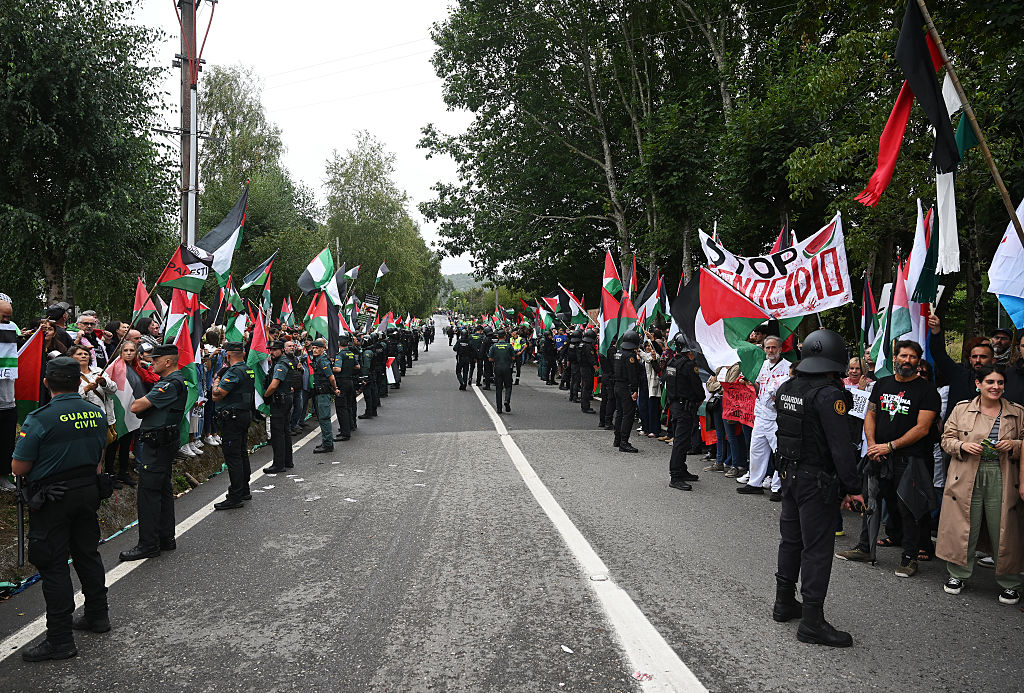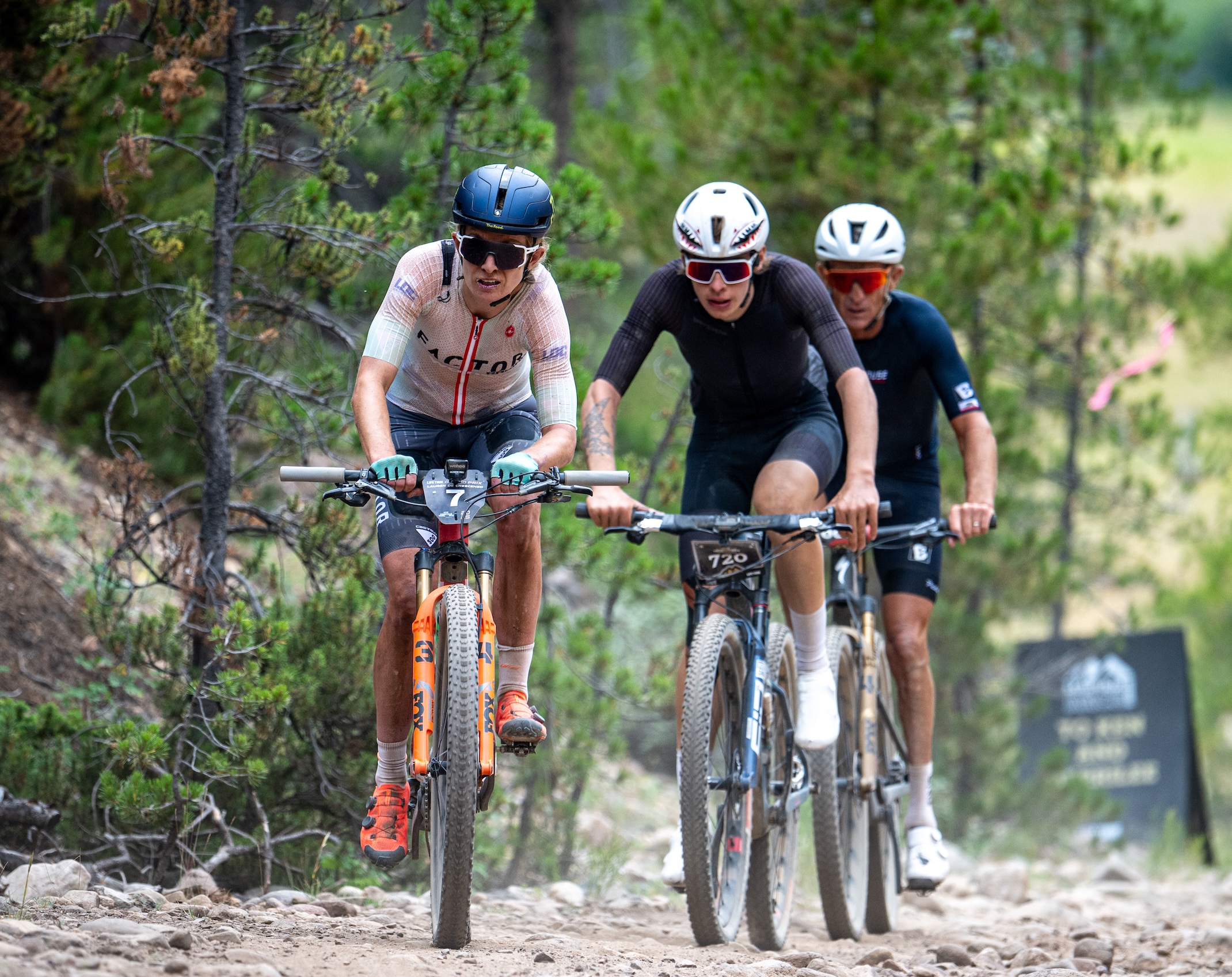'It's a crazy situation and it will be getting worse' - First-person account on how stage 16 of Vuelta a España descended into chaos
A second part-suspension of a Vuelta stage takes place as pro-Palestine protesters over-run the originally planned finish area

The latest race content, interviews, features, reviews and expert buying guides, direct to your inbox!
You are now subscribed
Your newsletter sign-up was successful
Coming out of the press room of stage 16 of the Vuelta a España early on Tuesday evening, one single phenomenon immediately made it clear that this was no normal day at the races: the noise.
Even from over a kilometre away from the race route, the chants of pro-Palestinian demonstrators standing on the roadside of the stage itself were plainly audible. It helped, of course, that the finale of stage 16 ran through a shallow, semi-rural valley just outside the city of Vigo, so the traffic noise was much lower than in a city.
But apart from the occasional honk of a team car horn as the race convoy approached from the foot of the valley, rather than the usual clatter of TV helicopters filming the stage or roars of support for the riders, all that could be heard at that distance were chants of "Viva Palestina! Viva Palestina! [Long live Palestine]."
On reaching the location where team buses were supposed to pick up their riders, the reason for the increasingly deafening noise became clear: a sea of Palestinian flags and supporters on one side of the road and lines of police, some with helmets on and shields at the ready, anxiously watching immediately next to them for if a tense situation worsened yet further.
It didn't matter that a light, incessant rain typical of Galicia was beginning to fall. Rather than a race pure and simple, this had veered towards something very different, and nothing was going to stop it.
The atmosphere felt more than volatile, with some protestors yelling "Complicit! Complicit!" at race journalists as they passed, and policemen nervously trying to keep the road clear from the dense crowds of protesters. It was clear that any attempt to get the race to reach this point, about two kilometres beyond the new finish and six before the planned summit where the stage should have ended, would have been more than futile.
Meanwhile on a nearby side road, the confusion continued apace. Perhaps a dozen team buses were rapidly trying to make their way through to a new location to pick up riders and other team vehicles heading out as well. But the waves of police lines and protesters made it an agonisingly slow process, with a mini-traffic jam building steadily, and nobody, given the demonstration, able to sort it out.
"They radioed through to tell us the finish line will be at eight kilometres to the finish and that's it, that's how it is, the buses are moving to the finish," Groupama-FDJ Sports Director Philippe Mauduit told Cyclingnews as he waited to leave.
The latest race content, interviews, features, reviews and expert buying guides, direct to your inbox!
As for the whole scenario, more reminiscent of a political disturbance than a bike race, he said, "It's a terrible situation for cycling. It's a crazy situation, and it will be getting worse."
There was room, as ever in tense situations, for jokes to arise. "Miguel Angel López is a visionary, he could see this coming", one reporter at the scene wisecracked, referring to the Colombian racer's decision to quit the race mid-stage on an almost identical route through Galicia four years ago.
But in fact, in one sense, the entire Vuelta could see it coming. Ever since a handful of protesters charged into the road on stage 5 to try to stop the Israel-Premier Tech squad in the team time trial, the cycle of protest, then the organisers' subsequent insistence the race would continue, and then another disruption has repeated itself - time and again
Bilbao was always expected to be a major flashpoint, and so it proved, with the stage partly suspended because of protesters near the finish. But as Javier Gullen, the race director, pointed out, the number of demonstrators on stage 16 was far higher and the questions about the race's feasability simply to continue have multipled too.
Essentially, each time another crisis has erupted, just like in the 2020 Giro d'Italia when the question was whether the pandemic would allow it to make it to Milan, or in 1998 when the Festina scandal all but poleaxed the Tour de France, the usual interest points of the race - the GC, the battle for stage wins - have diminished in relevance. And after the latest events in the Vuelta, there's no sign of that situation ending: just the opposite in fact.
"It's a very complicated situation, difficult to handle," Ezequiel Mosquera, the director of Galicia's top stage race, O Gran Camiño, told Eurosport.
"We've had problems in the past with the weather in our race, but circumstances like this you can't control, there's nothing you can do. I wouldn't like to be in the organisation's shoes. Let's hope the race can make it to Madrid."
And as the buses rolled away in search of their riders at the stage 16 finish, and the protesters’ chants continued, one young fan asked plaintively, "Where is the finish now? Where are the riders?"
It was, to say the least, a very good question, and one which will likely haunt the Vuelta all the way through to its finale - or hypothetical finale - in Madrid.
Subscribe to Cyclingnews for unlimited access to our 2025 Vuelta a España coverage. Our team of journalists are on the ground from the Italian Gran Partida through to Madrid, bringing you breaking news, analysis, and more, from every stage of the Grand Tour as it happens. Find out more.
Alasdair Fotheringham has been reporting on cycling since 1991. He has covered every Tour de France since 1992 bar one, as well as numerous other bike races of all shapes and sizes, ranging from the Olympic Games in 2008 to the now sadly defunct Subida a Urkiola hill climb in Spain. As well as working for Cyclingnews, he has also written for The Independent, The Guardian, ProCycling, The Express and Reuters.
You must confirm your public display name before commenting
Please logout and then login again, you will then be prompted to enter your display name.

